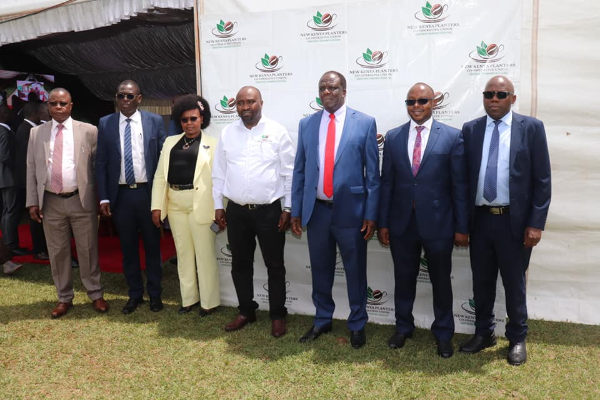
Kenya through the New Kenya Planters Cooperative Union (New KPCU) has launched 2023-2027 Strategic Plan for the coffee sector aiming to boost an average farmer’s production from 2kgs to 10kgs per bush.
In an event that brought together hundreds of farmers drawn from coffee unions and cooperatives in over 30 coffee growing counties in the country, it was an opportunity for the sector stakeholders to highlight the general outlook of the industry for the next few years.
According to Hon. Wycliffe Ambetsa Oparanya, the Cabinet Secretary (CS) for Cooperatives and MSMEs, the coffee sector still plays a critical role in the country’s economy as it acts aa a foreign exchange earner and a vital source of livelihood for over 800,000 farmers and many households in rural areas which depend on the coffee value chain.
“Coffee remains one of Kenya’s leading foreign exchange earners and a lifeline for many rural households,” said Oparanya yesterday during the launch adding that the past year has seen remarkable growth and resilience in the coffee sector.
Data from the Coffee Yearbook 2022/23 shows that in the financial year 2022-2023, coffee exports increased from 42,858 tonnes to 47,957 tonnes.
“This growth highlights the unwavering demand for Kenyan coffee on the global stage, with the total export value reaching $252.12 million (Sh32.5 billion),” said the CS.
However, the sector still faces myriad of challenges such as erratic weather and the natural cyclical nature of coffee production has recently caused production declined by six per cent to 0.81 million bags.
Other challenges that affected ted the sector include high input cost, shrinking coffee growing areas, delayed payments, climate change and fluctuating market prices.
“Additionally, weak governance in cooperative societies and outdated legislation have hindered the sector’s growth potential, as we’ve seen many cooperatives collapse due to poor practices like declaring dividends despite losses or borrowing to pay dividends that don’t align with actual performance margins,” Oparanya said.
He however, highlighted some of the reforms that the government has been carrying out in the sector as those that will help streamline the sector for the benefit of smallholders who are the majority of coffee producers in Kenya.
“For instance, we are currently working with the Co-operative University of Kenya (CUK) to develop the syllabus and farming manuals for the sector to help better inform the growers,” said the CS.
Known for quality coffee
According to Daniel K Kiprotich Chemno, the chairperson to the NEW KPCU board of directors, Kenya is still known for quality coffee in the world and that the union is ready to take the country back to its glory as one of the top producers.
“We are celebrating our coffee and we are also committed to grow the legacy and reclaim position among the top 10 coffee producers in the world,” said Chemno.
He highlighted the fact that the sector still has the older generation of 60 years old on average as the majority of farmers hence the plan to woo more youth into the sector through tailor-made programmes and strategies.
The chairperson also advocated to increase production of Robusta coffee especially in western Kenya where the variety was widely grown in yester years.
“There is need to empower the Coffee Research Institute (CRI) to develop Robusta coffee for our many farmers in the western region,” said Chemno.
In the strategic plan
In highlighting some of the main issues in the strategic plan, Mr. Timothy Mirugi, the New KPCU Managing Director said that the union will continue offering training and advisory services to farmers through established demo farms and other forums.
“We want to partner with farmer groups such as the unions and cooperatives to improve our efficiency in getting the right information to farmers and in distributing coffee inputs,” said Timothy.
Currently, over 415,000 farmers across the country have benefited from Ksh5.8 billion of coffee cherry fund thanks to the government support.
According to the MD, due to improvements in production, New KPCU is working hard to expand and modernise its facilities to help hand the volumes effectively.
“Today, we have 946,000sq warehouse capacity, we are modernising our Sagana facility and upgrading the New KPCU lab that will see us improve our service delivery to farmers and buyers.”
Among the other key issues in the strategic plan include, to capacity build 250 wet mills across coffee growing counties and also increase tonnage of coffee milled from 3,025 tonnes in 202/23 to 30,000t by 2027.
New KPCU is also looking at upgrading its 24 warehouses to the required world standards of operations and most importantly to improve farmer earnings from an average of Ksh70 per kilo of cherry to not less than Ksh135 by 2027.







